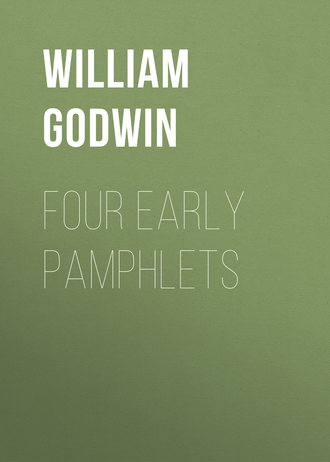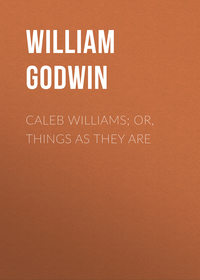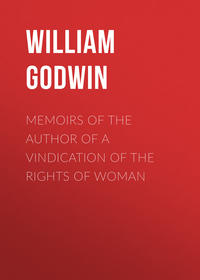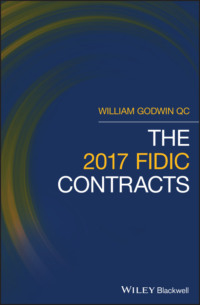 полная версия
полная версияFour Early Pamphlets

William Godwin
Four Early Pamphlets
A DEFENCE OF THE ROCKINGHAM PARTY, IN THEIR LATE COALITION WITH THE RIGHT HONOURABLE FREDERIC LORD NORTH
LONDON: Printed for J. STOCKDALE, opposite Burlington House, Piccadilly. 1783. [Price One Shilling and Sixpence.] Entered at Stationers Hall.
A DEFENCE OF THE ROCKINGHAM PARTY, &c. &c. &c.
* * * * *The present reign will certainly appear to our posterity full of the noblest materials for history. Many circumstances seem to have pointed it out as a very critical period. The general diffusion of science has, in some degree, enlightened the minds of all men; and has cleared such, as have any influence upon the progress of manners and society, from a thousand unworthy pre-possessions. The dissipation and luxury that reign uncontrouled have spread effiminacy and irresolution every where.—The grand defection of the United States of America from the mother country, is one of the most interesting events, that has engaged the attention of Europe for centuries. And the number of extraordinary geniuses that have distinguished themselves in the political world, gives a dignity to the scene. They pour a lustre over the darkest parts of the story, and bestow a beauty upon the tragedy, that it could not otherwise have possessed.
At a time like this, when the attention of mankind has been kept alive by a series of the most important events, we cease to admire at things which would otherwise appear uncommon, and wonders almost lose their name. Even now, however, when men were almost grown callous to novelty, and the youngest of us had, like Cato in the play, lived long enough to be "surprised at nothing," a matter has occurred which few expected, and to which, for that reason, men of no great strength of mind, of no nerve of political feeling, scarcely know how to reconcile themselves. I refer to the coalition between the friends of the late marquis of Rockingham and the noble commoner in the blue ribbon.
The manner of blaming this action is palpable and easy. The censure is chiefly directed against that wonderful man, whom, at least in their hearts, his countrymen, I believe, have agreed to regard as the person of brightest genius, and most extensive capacity, that now adorns the British senate. Has not this person, we are asked, for years attacked the noble lord in the most unqualified manner? Is there any aspersion, any insinuation, that he has not thrown out upon his character? Has he not represented him as the weakest man, and the worst minister, to whom the direction of affairs was ever committed? Has he not imputed to his prerogative principles, and his palpable misconduct, the whole catalogue of our misfortunes? If such men as these are to unite for the detested purposes of ambition, what security can we have for any thing valuable, that yet remains to us? Is not this the very utmost reach of frontless profligacy? What dependence after this is to be placed in the man, who has thus given the lie to all his professions, and impudently flown in the face of that honest and unsuspecting virtue, which had hitherto given him credit for the rectitude of his intentions?
I do not mean for the present to enter into a direct answer to these several observations. I leave it to others, to rest the weight of their cause upon sounding exclamations and pompous interogatories. For myself, I am firmly persuaded, that the oftner the late conduct of the Rockingham connexion is summoned to the bar of fair reason, the more cooly it is considered, and the less the examiner is led away by the particular prejudices of this side or of that, the more commendable it will appear. We do not fear the light. We do not shun the scrutiny. We are under no apprehensions for the consequences.
I will rest my argument upon the regular proof of these three propositions.
First—That the Rockingham connexion, was the only connexion by which the country could be well served.
Secondly—That they were not by themselves of sufficient strength to support the weight of administration.
Thirdly—That they were not the men whose services were the most likely to be called for by the sovereign, in the present crisis.
First—I am to prove, that the country could not be well served but by the Rockingham connexion.
There are three points principally concerned in the constituting a good administration; liberal principles, respectable abilities, and incorruptible integrity.—Let us examine with a view to these, the other four parties in the British government. The connexion of the earl of Shelburne, that of lord North, the Bedford party, and the Scottish. In reviewing these, it is necessary that I should employ a manly freedom, though, at the same time, I should be much unwilling to do a partial injustice to any of them.
It is true, there is some difference between the language of the same men in office, and out of office. The Bedford connexion, however, have never been conceived to bear an over favourable aspect to the cause of liberty. They are the avowed enemies of innovation and reform.
The Scottish party are pretty much confounded with the set of men that are called, by way of distinction, the king's friends. The design of these men has been to exalt regal power and prerogative upon the ruins of aristocracy, and the neck of the people. Arguments, and those by no means of a frivolous description, have been brought to prove, that a most subtle and deep-laid scheme was formed by them, in the beginning of the reign, to subserve this odious purpose. It has been supposed to have been pursued with the most inflexible constancy, and, like a skiff, when it sails along the meandering course of a river, finally to have turned to account the most untoward gales.
Lord North, whatever we may suppose to have been his intrinsic abilities, stands forward, as, perhaps, the most unfortunate minister, that this country ever produced. Misfortune overtook him in the assertion of the highest monarchical principles. In spite of misfortune, he adherred inflexibly to that assertion. In the most critical situations he remained in a state of hesitation and uncertainty, till the tide, that "taken at the flood, led up to fortune," was lost. His versatility, and the undisguised attachment, that he manifested to emolument and power, were surely unworthy of the stake that was entrusted to him.
In what I have now said, I do not much fear to be contradicted. It was not with a view to such as are attached to any of these parties, that I have taken up the pen. Those who come under this description, are almost universally the advocates of monarchy, and think that they have nothing to regret, but that power and police are not established upon a more uncontrolable footing among us. To such persons I do not address myself. I know of nothing that the friends of lord Rockingham have to offer that can be of any weight with them; and, for my own part, I should blush to say a word, that should tend to conciliate their approbation to a system, in which my heart was interested. The men I wish chiefly to have in view, are those that are personally attached to the earl of Shelburne; such as stand aloof from all parties, and are inclined to have but an indifferent opinion of any; and such as have adhered to the connexion I have undertaken to defend, but whose approbation has been somewhat cooled by their late conduct. The two last in particular, I consider as least under the power of prejudice, and most free to the influence of rational conviction.
The friends of freedom have, I believe, in no instance hesitated, but between the Rockingham connexion, and the earl of Shelburne. It is these two then that it remains for me to examine. Lord Shelburne had the misfortune of coming very early upon the public stage. At that time he connected himself with the earl of Bute, and entered with warmth into the opposition to Mr. secretary Pitt. In this system of conduct, however, he did not long persist; he speedily broke with the favourite, and soon after joined the celebrated hero, that had lately been the object of his attack. By this person he was introduced to a considerable post in administration. In office, he is chiefly remembered by the very decisive stile of authority and censure he employed, in a public letter, relative to the resistance that was made to the act of 1767, for imposing certain duties in America. From his resignation with lord Chatham, he uniformly and strenuously opposed the measures that were adopted for crushing that resistance. He persevered, with much apparent constancy, in one line of conduct for near ten years, and this is certainly the most plausible period of his story. He first called forth the suspicions of generous and liberal men in every rank of society, by his resolute opposition to the American independency in 1778. But it was in the administration, that seemed to have been formed under so favourable auspices in the spring of 1782, that he came most forward to general examination.
The Rockingham connexion, in conformity to what were then supposed to be the wishes of the people, united, though not without some hesitation, with the noble earl and his adherents, in the conduct of public affairs. And how did he reward their confidence? He was careful to retain the question respecting his real sentiments upon the business of America, in as much obscurity as ever. He wrote officially a letter to sir Guy Carleton, which has never seen the light, by which that officer was induced to declare the American independency already irreversibly recognised by the court of London; by which he appears to have deceived all his brother ministers without exception; and by which Mr. Fox in particular, was induced to make the same declaration with general Carleton to foreign courts, and to come forward in the commons peremptorily to affirm, that there was not a second opinion in the cabinet, upon this interesting subject. How must a man of his undisguised and manly character have felt, when, within a week from this time, he found the noble earl declaring that nothing had ever been further from his thoughts, than an unconditional recognition; and successfully exerting himself to bring over a majority in the cabinet to the opposite sentiment? Lord Shelburne's obtaining, or accepting, call it which you will, of the office of first lord of the treasury, upon the demise of lord Rockingham, without the privity of his fellow Ministers, was contrary to every maxim of ingenuous conduct, and every principle upon which an association of parties can be supported. The declaration he made, and which was contradicted both by his own friends in the cabinet, and those of Mr. Fox, that he knew of no reason in God's earth for that gentleman's resignation, but that of his having succeeded to the office of premier, was surely sufficiently singular.
But he is celebrated for being a man of large professions, and by these professions he has induced some persons in different classes in society, to esteem him the friend of liberty and renovation. What he has held out, however, upon these heads, has not been entirely confident. He has appeared the enthusiastical partizan of the aristocracy, a kind of government, which, carried to its height, is perhaps, of all the different species of despotism, the most intolerable. He has talked in a very particular stile of his fears of reducing the regal power to a shadow, of his desire that the extension of prerogative should keep pace with the confirmation of popular rights, and his resolution, that, if it were in his power to prevent it, a king of England should never be brought to a level with a king of Mahrattas. The true sons of freedom will not certainly be very apprehensive upon this score, and will leave it to the numbers that will ever remain the adherents of monarchical power, to guard the barriers of the throne. In opposition, his declarations in favour of parliamentary reform seemed indeed very decisive. In administration, he was particularly careful to explain away these declarations, and to assure the people that he would never employ any influence in support of the measure, but would only countenance it so far as it appeared to be the sense of parliament. In other words, that he would remain neutral, or at most only honour the subject with an eloquent harangue, and interest himself no further respecting it.
But let us proceed from his language to his conduct in office. Almost every salutary measure of administration, from the resignation of lord North downward, was brought about during the union of the noble earl with the Rockingham connexion. What inference are we to draw from this?—That administration, as auspicious as it was transitory, has never been charged with more than one error. They were thought too liberal in the distribution of two or three sinecures and pensions. To whom were they distributed? Uniformly, exclusively, to the friends of lord Shelburne. Lord Shelburne proposed them to his august colleague, and the marquis, whose faults, if he had any, were an excess of mildness, and an unsuspecting simplicity, perhaps too readily complied. But let it be remembered, that not one of his friends accepted, or to not one of his friends were these emoluments extended. But, if the noble marquis were sparing in the distribution of pensions, the deficiency was abundantly supplied by his successor. While the interests of the people were neglected and forgotten, the attention of the premier was in a considerable degree engrossed by the petty arrangements of office. For one man a certain department of business was marked out; the place had been previously filled by another. Here the first person was at all events to be promoted; and the second gratified with a pension. Thus, in the minute detail of employment, in adjusting the indeclinables of a court calendar, to detach a commis from this department, and to fix a clerk in that, burthen after burthen has been heaped upon the shoulders of a callous and lethargic people.—But no man can say, that the earl of Shelburne has been idle. Beside all this, he has restored peace to his country. His merits in this business, have already been sufficiently agitated. To examine them afresh would lead me too far from the scope of my subject. I will not therefore now detain myself either to exculpate or criminate the minister, to whom, whatever they are, they are principally to be ascribed.
From the considerations already suggested, I am afraid thus much may be fairly inferred, that the earl of Shelburne is a man, dark, insidious and inexplicit in his designs; no decided friend of the privileges of the people; and in both respects a person very improper to conduct the affairs of this country. I would hope however, that the celebrated character given of him by the late lord Holland was somewhat too severe. "I have met with many, who by perseverance and labour have made themselves Jesuits; it is peculiar to this man to have been born one."
Such then is the estimate we are compelled to form of a man who in his professions has sometimes gone as far, as the most zealous votaries of liberty. And what is the inference we shall draw from this? Shall we, for the sake of one man so specious and plausible, learn to think the language of all men equally empty and deceitful? Having once been betrayed, shall we avoid all future risk, by treating every pretender to patriotism and public spirit, as a knave and an impostor? This indeed is a conclusion to which the unprincipled and the vicious are ever propense. They judge of their fellows by themselves, and from the depravity of their own hearts are willing to infer, that every honesty has its price. But the very motive that inclines the depraved to such a mode of reasoning, must, upon the very same account, deter the man of virtue from adopting it. Virtue is originally ever simple and unsuspecting. Conscious to its own rectitude, and the integrity of its professions, it naturally expects the same species of conduct from others. By every disappointment of this kind, it is mortified and humbled. Long, very long must it have been baffled, and countless must have been its mortifications, ere it can be induced to adopt a principle of general mistrust. And that such a principle should have so large a spread among persons, whose honesty, candour forbids us to suspect, is surely, of all the paradoxe upon the face of the earth, incomparably the greatest.—The man of virtue then will be willing, before he gives up all our political connexions without distinction, to go along with me to the review of the only one that yet remains to be examined, that of the late marquis of Rockingham.
Too much perhaps cannot be said in their praise. They have nearly engrossed the confidence of every friend of liberty. They are the only men, whose principles were never darkened with the cloud of suspicion. What, let me ask, has been their uniform conduct during the whole course of the reign? They have been ever steady in their opposition, to whatever bore an ill aspect to the cause of freedom, and to the whole train of those political measures, that have terminated in calamity and ruin. They have been twice in administration. Prosperity and power are usually circumstances that prove the severest virtue. While in power how then did this party conduct themselves?
Of their first administration the principal measure was the stamp act. A law that restored tranquility to a distracted empire. A law, to which, if succeeding administrations had universally adhered, we had been at this moment, the exclusive allies and patrons of the whole continent of North America. A law, that they carried in opposition to the all-dreaded Mr. Pitt, on the one hand, and on the other, against the inclination of those secret directors, from whose hands they receive their delegated power. They repealed the excise upon cyder. They abolished general warrants. And after having been the authors of these and a thousand other benefits in the midst of storms and danger; they quitted their places with a disinterestedness, that no other set of men have imitated. They secured neither place, pension, nor reversion to themselves, or any of their adherents.
Their second administration was indeed very short. But it was crowded with the most salutary measures. The granting a full relief to Ireland. The passing several most important bills of oeconomy and reformation. The passing the contractors bill. The carrying into effect that most valuable measure, the abolishing the vote of custom-house officers in the election of members of parliament. And lastly, the attempt to atchieve, that most important of all objects, the establishment of an equal representation. What might not have been expected from their longer continuance in office?
But I will not confine myself to the consideration of their conduct as a body. The characters of the individuals of which they are composed, will still further illustrate their true principles, and furnish a strong additional recommendation of them, to every friend of virtue and of liberty. That I may not overcharge this part of my subject, I will only mention two or three of their most distinguished leaders.
The character of the present chancellor of the exchequer is entirely an unique. Though mixing in all the busy scenes of life, though occupying for many years a principal place in the political affairs of this country, he has kept himself unspotted from the world.—The word of the elder Cato was esteemed so sacred with the Romans, that it became a proverb among them respecting things, so improbable, that their truth could not be established even by the highest authority, "I would not believe it, though it were told me by Cato." And in an age much more dissipated than that of Cato, the integrity and honour of the noble lord I have mentioned, has become equally proverbial. Not bonds, nor deeds, nor all the shackles of law, are half so much to be depended upon as is his lightest word. He is deaf to all the prejudices of blood or private friendship, and has no feelings but for his country.
Of the duke of Portland, I can say the less, as not having had an opportunity of knowing much respecting him. His candour and his honour have never been questioned. And I remember, in the debate upon the celebrated secession of the Rockingham party, upon the death of their leader, to have heard his abilities particularly vouched in very strong terms, by Mr. chancellor Pitt, and the present lord Sidney. The latter in particular, though one of my lord Shelburne's secretaries of state, fairly avowed in so many words, that he should have been better satisfied with the appointment of his grace, to the office he now holds, than he was, with the noble lord, under whom he acted.
The character of lord Keppel, with persons not attached to any party, has usually been that of a man of much honesty and simplicity, without any remarkable abilities. It is a little extraordinary however, that, though forced by a combination of unfavourable circumstances into a public speaker, he is yet, even in that line, very far from contempt. His speeches are manly, regular, and to the purpose. His defence upon his trial at Portsmouth, in which he must naturally be supposed to have had at least a principal share, has, in my opinion, much beauty of composition. The adversaries of this party, though unwilling to admit that the navy was so much improved under his auspices as was asserted, have yet, I believe, universally acknowledged his particular activity and diligence.
But I come to the great beast of his own party, and the principal object of attack to their enemies, the celebrated Mr. Fox. Men of formality and sanctity have complained of him as dissipated. They do not pretend however to aggravate their accusation, by laying to his charge any of the greater vices. His contempt of money, and his unbounded generosity, are universally confessed. Let such then know, that dissipation, so qualified, is a very slight accusation against a public man, if indeed it deserves a serious consideration. In all expansive minds, in minds formed for an extensive stage, to embrace the welfare and the interest of nations, there is a certain incessant activity, a principle that must be employed. Debar them from their proper field, and it will most inevitably run out into excesses, which perhaps had better have been avoided. But do these excrescences, which only proceed from the richness and fertility of the soil, disqualify a man for public business? Far, very far from it. Where ever was there a man, who pushed dissipation and debauchery to a greater length, than my lord Bolingbroke? And yet it is perhaps difficult to say, whether there ever existed a more industrious, or an abler minister. The peace of Utrecht, concluded amidst a thousand difficulties, from our allies abroad, and our parties, that were never so much exasperated against each other at home; must ever remain the monument of his glory. His opposition to sir Robert Walpole seems evidently to have been founded upon the most generous principles. And though the warmth and ebullition of his passions evermore broke in upon his happiest attempts, yet were his exertions in both instances attended with the most salutary consequences. But Mr. Fox appears to me to possess all the excellencies, without any of the defects of lord Bolingbroke. His passions have, I believe, never been suspected of having embroiled the affairs of his party, and he has uniformly retained the confidence of them all. His friendships have been solid and unshaken. His conduct cool and intrepid. The littleness of jealousy never discoloured a conception of his heart. In office he was more constant and indefatigable, than lord Bolingbroke himself. All his lesser pursuits seemed annihilated, and he was swallowed up in the direction of public affairs.
He has been accused of ambition. Ambition is a very ambiguous term. In its lowest sense, it sinks the meanest, and degrades the dirtiest of our race. In its highest, I cannot agree with those who stile it the defect of noble minds. I esteem it worthy of the loudest commendation, and the most assiduous culture. Mr. Fox's is certainly not an ambition of emolument. Nobody dreams it. It is not an ambition, that can be gratified by the distribution of places and pensions. This is a passion, that can only dwell in the weakest and most imbecil minds. Its necessary concomitants, are official inattention and oscitancy. No. The ambition of this hero is a generous thirst of fame, and a desire of possessing the opportunity of conferring the most lasting benefits upon his country. It is an instinct, that carries a man forward into the field of fitness, and of God.









